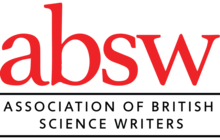
The American Association for the Advancement of Science (AAAS) is an American international non-profit organization with the stated goals of promoting cooperation among scientists, defending scientific freedom, encouraging scientific responsibility, and supporting scientific education and science outreach for the betterment of all humanity. It is the world's largest general scientific society, with over 120,000 members, and is the publisher of the well-known scientific journal Science.

Sports journalism is a form of writing that reports on matters pertaining to sporting topics and competitions. Sports journalism started in the early 1800s when it was targeted to the social elite and transitioned into an integral part of the news business with newspapers having dedicated sports sections. The increased popularity of sports amongst the middle and lower class led to the more coverage of sports content in publications. The appetite for sports resulted in sports-only media such as Sports Illustrated and ESPN. There are many different forms of sports journalism, ranging from play-by-play and game recaps to analysis and investigative journalism on important developments in the sport. Technology and the internet age has massively changed the sports journalism space as it is struggling with the same problems that the broader category of print journalism is struggling with, mainly not being able to cover costs due to falling subscriptions. New forms of internet blogging and tweeting in the current millennium have pushed the boundaries of sports journalism.
The Football Writers' Association (FWA) is an association of football journalists and correspondents writing for English newspapers and agencies. It presents the Footballer of the Year Award, the oldest and most distinguished award given in the domestic game. In 2018, recognising the growth of the woman's game, it announced a Woman's Footballer of the Year Award.

Wendy M. Grossman is a journalist, blogger, and folksinger. Her writing has been published in several newspapers, magazines, and specialized publications. She is the recipient of the 2013 Enigma Award for information security reporting.

Ben Michael Goldacre is a British physician, academic and science writer. He is the first Bennett Professor of Evidence-Based Medicine and director of the Bennett Institute for Applied Data Science at the University of Oxford. He is a founder of the AllTrials campaign and OpenTrials to require open science practices in clinical trials.

Science journalism conveys reporting about science to the public. The field typically involves interactions between scientists, journalists, and the public.
Investigative Reporters and Editors, Inc. (IRE) is a nonprofit organization that focuses on improving the quality of journalism, in particular investigative journalism. Formed in 1975, it presents the IRE Awards and holds conferences and training classes for journalists. Its headquarters is in Columbia, Missouri, at the University of Missouri School of Journalism. It is the largest and oldest association of investigative journalism.
The American Society of Journalists and Authors (ASJA) was founded in 1948 as the Society of Magazine Writers, and is the professional association of independent nonfiction writers in the United States.
Anjana Ahuja is a British Indian science journalist and a former columnist for The Times. She is now a contributing writer at the Financial Times. She also contributes to The Daily Telegraph, Prospect, New Scientist and the Radio Times. She was named Best Science Commentator at the 2013 Comment Awards. Ahuja, who was educated at a comprehensive school in Essex, read physics at Imperial College London, and then took a PhD in space physics during which she worked on data about the Sun's magnetic field from the Ulysses probe.

Angela Saini is a British science journalist, broadcaster and the author of books, of which the third, Superior: The Return of Race Science, was published in 2019. Her work has appeared in Science, Wired, The Guardian, The New Humanist and New Scientist. She is also a presenter on BBC radio.
The British Guild of Agricultural Journalists is a membership organisation representing editors and journalists, broadcasters, photographers, public relations and marketing specialists working in agriculture, commercial horticulture and other rural industries in the United Kingdom.
Nalaka Gunawardene trained as a science writer, he has worked as a journalist, broadcaster and development communicator since 1987.
The Sports Journalists' Association (SJA) is an association for British sports journalists. It represents the British sports media on the British Olympic Association's press advisory committee and acts as a consultant to organizers of major events who need guidance on media requirements as well as seeking to represent its members' interests in a range of activities. Its president is Patrick Collins, the distinguished former sports columnist for the Mail on Sunday who succeeded veteran broadcaster and columnist Sir Michael Parkinson in the role. Membership is open to journalists, photographers, broadcasters, reporters, editors, and cartoonists. However, in order to obtain a full membership you have to be a journalist based in the United Kingdom.

Edmund Soon-Weng Yong is a Malaysian-born British science journalist. He is a staff member at The Atlantic, which he joined in 2015. In 2021 he received a Pulitzer Prize for Explanatory Reporting for a series on the COVID-19 pandemic.
Elizabeth Gibney is a senior physics reporter at Nature. She has written for Scientific American, BBC and CERN.
Carbon Brief is a UK-based website specialising in the science and policy of climate change. It has won awards for investigative journalism and data visualisation. Leo Hickman is the director and editor for Carbon Brief.

Katharine Anne Giles was a British climate scientist. Her research considered sea ice cover, ocean circulation and wind patterns. She was a passionate science communicator, and since 2015, the Association of British Science Writers has held a science communication award in her honour.
Helen Pearson is a science journalist, author and Chief Magazine Editor for the journal Nature, where she oversees the journalism and opinion content. She is the author of The Life Project, a book about the British birth cohort studies, a series of longitudinal studies which have tracked thousands of people since their birth.

Amy Maxmen is an American science writer and journalist who is a senior reporter at Nature. She covers evolution, medicine, science policy and scientists. She was awarded the Victor Kohn Prize for Excellence in Medical Science Reporting for her coverage of the COVID-19 pandemic.









